



So, Africa! [Map]���Kenya's East Coast. [Map]��������������������������(Some pics at foot of page)
Africa as you will have no doubt imagined is a truly wild & potent experience - breathtaking just to be there - a place of dreams from screens and magazines and so forth, not to mention childhood fantasies... And the reality - loud, silent, smelly, dirty, dangerous, poverty-stricken, crumbling, soaring, spacey, warm and friendly REALITY (plus half a million other adjectives maybe!) Like India I suppose - so completely itself and nothing quite like it - a constant tragedy alongside a daily miracle of human, animal and environmental survival and, unfortunately, destruction. So much has been destroyed but so much still survives... How the people live through their existence and still manage to be friendly, smiling and open, full of energy and life, I don't know...
Kenya was a total mixture of images and emotions.
To start from beginnings - Jirka spotted the offer in a brochure from a local travel agency. It seemed so cheap. The hotel was only 2 star plus and that worried me a little thinking it might be very basic, but as it happened my fears were totally unfounded. (It was beautiful - grounds, meals, facilities, everything...)
The flight took 8 hours or so (African Safari Airlines). The last long trip was to Thailand last year in November and that was about 11 hours, so this one wasn't so long and we were a bit prepared. Compared to the Thai flight this plane (a DC10) was very spartan - the Lauda flight to Thailand had a TV monitor on each seat back and a multimedia program to go with it. The ASA DC10 had very little. We travelled through the night and both eventually got something like sleep with Jirkas head resting in my lap (I only had to wake her a few times when a body part started to go numb!)
Mombasa airport was a bit of a surprise - very modern looking and impressive. We moved through customs quite quickly and then suddenly: we were in Africa. We immediately experienced the African tempo - which is to say slowly, slowly (in Sawhili: 'Pole pole', phon: poelay poelay - as in Edgar Allen... We were told the coach to take us to the hotel would be slightly delayed so we waited in the airport car park and looked around us at the unfamiliar trees, birds, insects and flowers and people. We waited quite a time, something over an hour...
Eventually the coaches came and we started the journey towards the hotel. We got our first real shock then. The area surrounding the airport is very poor, in fact to our unfamiliar eyes they looked more like the outskirts of hell than those of a modern airport. We knew the Third World conditions could be rough but we weren't prepared for the complete destitution and ramshackle nature of what we saw along those streets. Makeshift rickety stalls with dirty looking clothes or dubious fruit side by side with scrap merchants yards piled high with rusting machinery and car parts and everywhere unemployed men lounging or walking shiftlessly or staring at the passing buses. Many children were also making their way through the debris - some very neat and lovely on their way to school, sometimes bare-footed. As we drove further we came to desperate looking blocks of flats horribly discoloured by mould due to the humidity and many apartments looked so tiny - we wondered that people could live in those conditions but I suspected that these could possibly be considered dream homes in this area
After driving for about half an hour we started to reach countryside and soon we came to a guarded front gate and a long pole barring the road.
When we passed through we entered a different world. We had reached paradise. Paradise & purgatory with only a fence between. We got off the bus and walked up the steps to our hotel (Palm Beach) to be greeted by an attendant in a pith helmet and waiters with large green coconuts with straws in to quench our thirsts.
We sat stunned in the lobby. It felt impossible to take in what we had seen and make some sense of the difference within this tourist compound - but anyway we sat in the large and lovely foyer and sipped our coconuts in stunned silence before I went to the reception desk to get our keys.
The hotel was beautiful constructed in African style with thatched roofs and incredible ceilings of wooden beams of unfinished branches & trunks in intricate patterns. The hotel was a club (we didn't know it before we arrived) so each evening there were special events with music of various kinds (high standard, good musicians, I like that certain African style of guitar picking), dancing, documentary films on Africa, African markets and a lot of other things going on. Also, the hotel was one of 4 hotels strung out next to each other along the beach all owned by the African Safari Club and we could stroll to these, use their facilities, have meals, drinks, etc. if we wanted (there was no need to use cash in any of them - just to sign a receipt paid at the end of the holiday).
The grounds of all of the hotels were wonderful; amazing plants (how many were native to Africa I don't know - I know some were not - such as the giant cactii) and beautiful vistas out to the coral reef and the Indian Ocean beyond (wonderful sea colour - breathtakingly beautiful). The weather was perfect. Not too humid, a nice balmy feeling on the skin (very like in Thailand). There was always a breeze (sometimes it became just a touch too strong - but mostly it was okay). The breeze also kept the area totally free of mosquitos - I'd worried about them - I always get so many bites). In the grounds of our hotel we also had a family or two of very cheeky monkeys. We had some fun trying to keep our fruit (mangos, papaya, bannanas, etc) from being stolen from our room! One time Jirka had to jump up and wrestle one of our mangoes out of the monkey's hands! It had stolen into the room from the balcony so quietly! I think I got the greatest shock as suddenly Jirka was leaping across the room knocking this mango rolling while the monkey hesitated between fleeing and making another grab for the mango and bearing its teeth at Jirka in a face off! I was more concerned that Jirka would get bitten than anything else. But she (the monkey) thought better of it and we won that round! They won all subsequent rounds though as the scattered remains of bananas and mangoes on our balcony could testify! The monkeys were very cute, we fed them biscuits and bread rolls along with bananas from time to time and took lots of photos of each of them: Mom, Dad and Junior.
The beaches are beautiful, white sand, fringed with coconut palms -paradise. And the sea - the colours! Wonderful blues, aquamarine and turquoise...breathtaking. On the beaches though, you have to contend with the beach boys, young Kenyans who want to sell you stuff - whether it's a safari to one of the national parks, hand carved wooden key fobs or clothes, ornamental masks, elephants, giraffes, etc. If they can't sell you something they'll ask if you have any socks, hairband or shirt you'd like to exchange for a family of wooden elephants or rhino. (Socks are especially highly prized as you can't get them in good quality in Kenya). The beach boys can get a bit wearing on the spirits especially if you just want to unwind with a quiet walk along the beach - but they're not so bad - what they sell is mostly of good quality - but naturally when you meet them at first and they all want to sell you something it's instinctive to be suspicious. It's a tricky situation to handle as the prices they ask are low to us but sometimes are quite high in Kenyan terms. The Kenyan people in general are very honest and very friendly and open - probably from all being in the same boat - having so little, but also because of the tribal system and living so cheek by jowl. They are a very sociable people and see the European requirements for peace and aloneness as a bit strange!
On the beach there were also the Masai men - amazingly tall and thin and extremely elegant in their traditional robes and reddened hair. They are so thin - you have to see them to believe...
So we enjoyed wandering among the plants and pathways, the pools and enjoying nice meals in the hotel restaurant (price included half board) observing the multi-coloured lizards and chameleons, exotic juice cocktails, African music (a la Paul Simon) and romantic walks by landscaped moonlit ponds complete with peacocks, herons and black swans. (It sounds like a fantasy land and yes, it bears no real relation to the real Africa, but accepted on it's own terms it was very pleasant & very beautiful - though exclusive & I did feel for the Africans themselves who are excluded and this is enforced using African guards, mostly Masai - not dangerous - just there to divert the beach boys or any unwelcome intruders?)
We made a couple of trips by coach booked in the hotel (we never quite got up enough trust in the beach boys to try one of their cheaper trips though I think it could have been fine). Our first was a trip to the town of Malindi. (Named after Vasco da Gama's wife Malinda). Our trip took us also to a crocodile farm and a bird sanctuary and also to the ruins of an old Arab town on the coast called Gedi. A few hundred years ago the Arabs came and settled trading towns building mosques and wells and many fine buildings. Changes in trading patterns, marauding invaders and malaria caused the towns to be abandoned to the jungle. We saw some amazing Bao-Bab trees on this trip - they can live to more that 1000 years - I've never seen such trees - beautiful (I've wanted to see one since I read 'The Little Prince' by St.Auxpiery (sp.?)
We had lunch at a very beauitiful hotel on the coast by Malindi called the Watamu Beach Club (also part of the African Safari Club network - Swiss owned by the way). There is such a beautiful view from the hotel of the ocean and little islands. Before we had to leave we took a walk to some nearby spectacular cliffs where the breakers crash into the rocks and the spay leaps way up into the air.
Our second trip was the Bush Tour and this was into the heart of the bush through a scattered African village. We saw how the people lived there far from the tourists, the traditional mud huts, the very many (and uniformly beautiful) children, the plants, fruits, crops (Sisal mostly) and landscape. It was a bumpy and precarious trip as a couple of days before we had had a day of rain (the only one of the trip) and the red dirt track was heavily rutted (I was impressed with our African driver for getting through it at all!). This was an interesting trip and we got a feel for how most of the people live. Often there are several mud huts surrounding a bare red mud central area where the dogs & children play, sleep and pass the time, usually there are banana, papaya and mango trees and sometimes pinapples. Near self-sufficiency is of course an absolute necessity. If you have some cows you're well off. To marry, a man generally needs either cash or cows to pay over for his bride - if he is very rich in cash or cows he can have up to 4 wives.
We also made a trip on our own to Mombasa travelling by Matatu - this was quite an experience! A Matatu is a tiny mini bus with perhaps three rows of seats fitted in it and you enter via the sliding door on the side. Invariably there is a hi-fi system blaring gangsta reggae or something... You've got to imagine hundreds and hundreds of these careening about, the peeping of the horns to attract prospective passengers along the route and the constant yelling out of the destination. The Matatu stops when there is a customer or when somebody wants out, there are no scheduled stops. Personal body space can be forgotten - these guys could get a football team into a telephone box! So it was everyday LIFE right in your face - no tourist luxury - but great - lively to say the least! Jirka ended up with a beautiful little girl in her lap and we all bombed down this rocky road like human sardines in a tin-can recording studio getting our ears blasted off by the music while about as colourful and exotic a scene as you can imagine flowed by outside! When we got to Mombasa there were thousands of these Matutus (there IS no other mode of transport unless you have a push bike or are one of the extremely few with a car and so the clientele ranges from snotty-nosed kids to young executives all very neat in shirt & tie!). At first, Mombasa was a cacophany of horns and shouting but as we wandered off down a side street we began to chill out and enjoy, buying some coconuts for juice and bananas? We wandered until we found Fort Jesus, one of the main sites of interest in Mombasa. There we picked up a guide (or he picked us up more like) reduced his price by about half (you must - luckily we'd been forewarned what was a reasonable price). He showed us round the fort telling us the history (the Arabs, then the Portuguese, then the English controlled things over the years - apparently the Portuguese were most cruel) then guided us around the Old Town of Mombasa and to the port (Mombasa is built on an island - it used to be the capital of Kenya until they decided it was safer inland and swopped to Nairobi). We bought several things from street traders and then visited a spice shop. Jirka was like a kiddie in a sweety factory here and we ended up with more stuff than we could pay for what with a bit of this and a bit of that? Still, as she says, it's cheaper there and you can't get it here and so forth? I'm best not to ask, really! :O)
The Old Town has some interesting buildings from the time of the British and various agencies have tried to ensure that it is saved for the future but it's sinking down into slum conditions. Still, it's a vital, exotic and lively place, if you can survive the sound levels in some places and the rubbish in others? The people are very exotic, the costumes and the faces? The Matatu trip is ridiculously cheap - 20 Kenyan shillings - the price of three bananas or so - equivalent to about 20 British pence (the ride takes about half an hour).
After a few visits to the beach (while Jirka swam) and getting to know a few of the beach boys I made the aquaintance of Ali - he'd tried to sell me his wooden key fobs and I'd ended up giving him some money instead. So one day when we started off doing a rock-pooling walk (really great place to do it - long long stretch with many pools, little caves, crabs, & stuff & usually a fisherman to tell you about everything) we bumped into him and he offered us a trip by catamaran to a point some miles down the coast. It was a good price so we went. The catamaran was made from a single tree trunk and had a single tattered old sail. Ali came with us along with our captain at the back steering and one other hopping about changing tack.
We got a rundown on the state of Kenya in general, a bit of history, politics and hopes for the future. Kenya has many many problems. One of the chief problems is corruption in public life - it seems to run from the bottom to the top. All the money from the number one money earner, tourism, seems to disappear straight into the politicians pockets and it's needed so much for roads, houses, schools and infastructure in general. Grant money from various governments comes in for roads. In one case money came in for a particular road from three seperate sources and still it was never built. There is 50% unemployment and most of the people living in the villages, even the ones by the coast which mostly house those working in tourism (hotel waiters, cleaners, etc.) have no running water or electricity. Malaria and Aids are rife. I read just the other day that 700,000 children die in the world each year from Malaria alone - partly from one simple reason, that mosquito nets are not available to them. There is a push on to try to get these nets to people now. Along Kenyas coast I think the estimate is that 1 in 8 have Aids. Then there is the general turmoil in Africa - Kenya has a border with Somalia and there are about 400,000 Somalian refugees in the country and quite a few have guns. Some Kenyans have been shot by them and the Kenyans find them in general to be "very rude". So it's not surprising that the beach boys try to make what they can from the tourists - my only surprise was that there were so few and that they quite often do in fact leave you in peace.
After the catamaran trip we arranged to meet Ali at the hotel gates and for him to show us round his village. We bought a huge bag of sweets for the children on his advice and gave these out as we went round. The conditions to our eyes are of course almost unlivable-in but they must make the best of things and do have the strong sociability within them - they really would have to as they all live within a stones throw of each other. Later we got to know another Ali through our neighbour at our table Kristoph (an intelligent young German who did what he could for Ali's family and was on his second trip). We visited Ali and his family in the village one morning. He, his wife and three children share one room and one bed with no running water or electricity supply. We went out with him to the reef in an even smaller boat than the catamaran, again carved from a single tree trunk - this time that was all there was - just us four sitting in a tree trunk with the water lapping at our elbows!
The reef was spectacular. First we went to a place of quite deep water within the reef and Jirka had her first experience of snorkling. She had an anxious time at first with the mask and so forth. But by the end she was addicted and enthusing about the amazing fish, the colours of the corals and the whole experience - 'like swimming in an aquarium she said. I got a taste of it too by leaning over the side of the boat and submerging my head (with mask) in the water - beautiful clear water - a whole other world... Later we went to the reef itself which runs in a long arc creating a two mile bay of shallow water. (It is submerged at certain times of the day). We went around finding starfish, crabs, sea cucumbers and many many colourful creatures in the little pools helped by Ali & another boatman who knew what to look for. A nice trip. 'Hopefully the photos will show...
We thought about going on a safari but they're quite expensive. We decided against it in the end and maybe we'll make another trip for that. Booking it while you're there means that having already paid for your hotel room when you go on a safari for two or three days you are then paying twice for your accomodation and meals. I'm certain the safari could be a very special experience though depending on how touristy it gets. Maybe we'll do it, we'll see. This trip was busy enough and we wanted to relax as much as possible too...
I particularly enjoyed in the evening sitting out on the balcony clad in as little as possible, feet up on the wooden rail, the gentle breeze flowing about me, listenening to the sussuration of the palm leaves and soft african serenade wafting up from below.
It was wonderful to de-stress in the land of Pole pole and Hakuna matata ("No problem"). I could only wish the Kenyans themselves could share in the paradise that is their own land. If a virtous circle could be created rather than the viscious one they now have then it could be truly possible.
Their one hope just now is a white man, Richard Leakey. I'm sure you'll have heard of the Leakey family - they are a phenomenon. As anthropologists they were responsible for most of the major finds of earliest Man in Africa. Richard Leakey wants to be President. He also wants to deal with corruption. He has already started within the current government of President Daniel Arap Moi. There is a lot of hope resting on this one man (he was born in Kenya). But what his chances really are no one knows. Moi fought him tooth and nail at first until foreign capital and tourists stopped coming, then he gave him a job to root out corruption. (A poison chalice if ever there was one I think). Everyone is waiting to see if he can achieve something - he really does appear to be the only hope for the man and woman in the street. The elections are coming up in two years I think but there are already moves afoot to manipulate things so that Moi can hang on longer... So it goes...
So a wonderful country with a difficult past, a beautiful beautiful coast with fertile land and proud, colourful, good-hearted and honest people who only need some honest leaders and a straight path toward a better future - they will do the rest. We came away with very positive feelings for the Kenyan people - they have a very individual atitude to life and a very special culture and outlook. I really hope things improve for them, they really deserve a better future than they have in front of them right now.
I applied for a window seat for us a week before the flight but it didn't happen. We didn't get to see Mount Kilimanjaro as we flew past but later I was able to get a good view of the Nile looking first from the side then later directly down the middle. Amazing! (That makes two amazing rivers in two years - last year on the flight back from Thailand I managed to look out over the Ganges). Later we passed over large tracts of desert in The Sudan - I was transfixed to the window for a time - it was indescribable seeing this vast brown expanse and the infinite patterns of rock outcrops, gullies, sand streams, etc. down below. And nary a sign of Man - really awsome with a strange other-world loveliness. (Peering out of the tiny observation window set in one of the emergency doors by the toilets is quite an art I find. You have to just get used to people digging you in the ribs as they either enter or emerge from the toilet while squashing your cheek and nose as close to the little round double glazed window as you can manage! I don't know why they don't make the damn things a bit bigger and easier to see out of! :O)
So, quite a trip - worthwhile but with many conflicting emotions. Africa certainly leaves an indelible impression... Unforgettable...
Back here in Austria we arrived to cold weather - Autumn seemed to have been by-passed. Since then the seasons have retraced their steps and Autumn is now in full swing. Beautiful to walk through the gardens of Sch�nbrunn Palace with all the bright yellow leaves in the trees and fluttering down & around and the squirrels scampering about.
Work for two weeks after returning was terrible. Time stretched endlessly and we'd brought the flu back with us from Africa. Our only consolation was to daydream about possible destinations for our next trip..... :O)
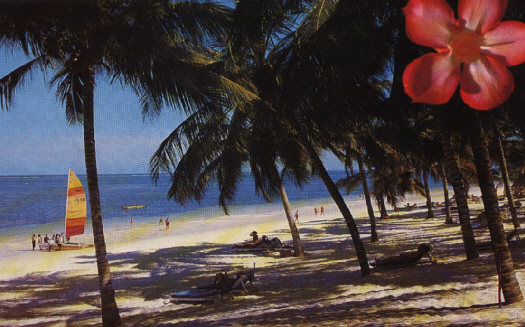
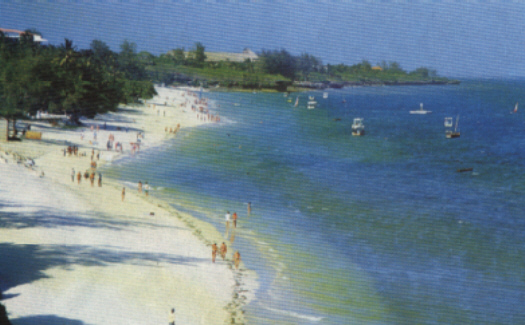
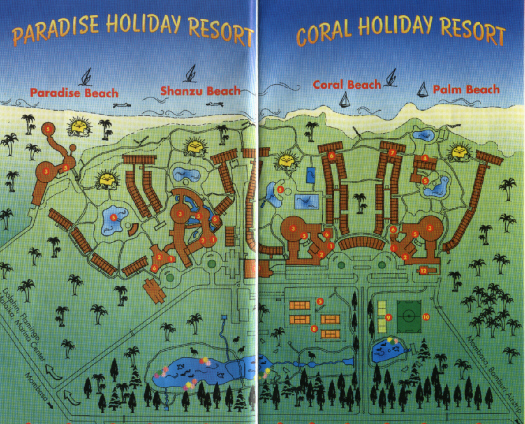
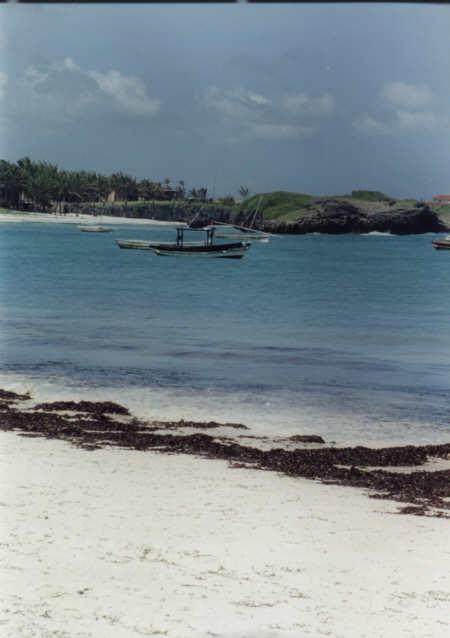
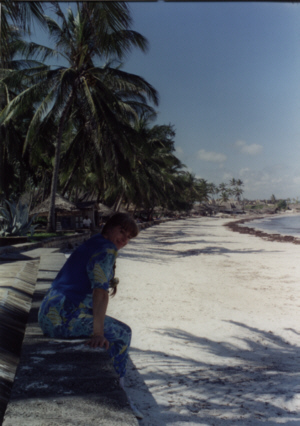
English is spoken in Kenya but it's nice to know some Swahili too! The most useful to start off with are probably these:
Quicktime Virtual Reality - Amboseli Reserve, Kenya
Quicktime Virtual Reality - Mara River
Great Photo - Ntutu People Jumping
